Damyang
담양군 | |
|---|---|
| Korean transcription(s) | |
| • Hangul | 담양군 |
| • Hanja | 潭陽郡 |
| • Revised Romanization | Damyang-gun |
| • McCune-Reischauer | Tamyang-gun |
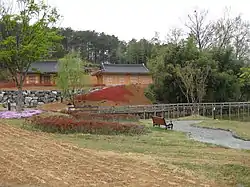 | |
 Flag  Emblem of Damyang | |
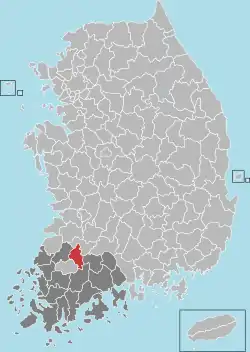 Location in South Korea | |
| Coordinates: 35°19′08″N 126°59′02″E / 35.3189°N 126.9839°E | |
| Country | |
| Region | Honam |
| Administrative divisions | 1 eup, 11 myeon |
| Area | |
| • Total | 455.09 km2 (175.71 sq mi) |
| Population (October,2022) | |
| • Total | 45,776 |
| • Density | 121/km2 (310/sq mi) |
| • Dialect | Jeolla |
Damyang County (Damyang-gun) is a county in Jeollanam-do, South Korea. Tourism is a major local industry. Notable local products include bamboo goods and strawberries.
Damyang is not to be confused with Danyang, which is located in eastern North Chungcheong Province.
Geography
The county comprises one eup (Damyang-eup, the seat), and eleven myeon (Bongsan-myeon, Changpyeong-myeon, Daedeok-myeon, Daejeon-myeon, Geumseong-myeon, Goseo-myeon, Mujeong-myeon, Nam-myeon, Subok-myeon, Wolsan-myeon, Yong-myeon).
Mountains
Chuwolsan and Byeongpungsan are popular hiking destinations. Also notable for its fortress (Geumseongsanseong): Geumseongsan.
Climate
| Climate data for Damyang (1993–2020 normals) | |||||||||||||
|---|---|---|---|---|---|---|---|---|---|---|---|---|---|
| Month | Jan | Feb | Mar | Apr | May | Jun | Jul | Aug | Sep | Oct | Nov | Dec | Year |
| Mean daily maximum °C (°F) | 5.5 (41.9) |
8.4 (47.1) |
13.6 (56.5) |
19.7 (67.5) |
24.7 (76.5) |
27.7 (81.9) |
29.5 (85.1) |
30.6 (87.1) |
27.1 (80.8) |
21.9 (71.4) |
14.9 (58.8) |
7.6 (45.7) |
19.3 (66.7) |
| Daily mean °C (°F) | 0.0 (32.0) |
2.1 (35.8) |
6.5 (43.7) |
12.4 (54.3) |
17.7 (63.9) |
22.3 (72.1) |
25.3 (77.5) |
25.8 (78.4) |
21.2 (70.2) |
14.8 (58.6) |
8.4 (47.1) |
2.0 (35.6) |
13.2 (55.8) |
| Mean daily minimum °C (°F) | −4.9 (23.2) |
−3.2 (26.2) |
0.1 (32.2) |
5.5 (41.9) |
11.6 (52.9) |
17.7 (63.9) |
21.9 (71.4) |
22.0 (71.6) |
16.7 (62.1) |
9.1 (48.4) |
2.9 (37.2) |
−2.9 (26.8) |
8.0 (46.4) |
| Average precipitation mm (inches) | 27.2 (1.07) |
39.7 (1.56) |
54.6 (2.15) |
89.7 (3.53) |
99.3 (3.91) |
150.5 (5.93) |
286.7 (11.29) |
308.3 (12.14) |
147.8 (5.82) |
64.0 (2.52) |
46.4 (1.83) |
29.8 (1.17) |
1,344 (52.91) |
| Average precipitation days (≥ 0.1 mm) | 6.4 | 5.6 | 7.0 | 7.4 | 7.8 | 8.6 | 14.0 | 12.2 | 8.5 | 5.4 | 6.8 | 7.1 | 96.8 |
| Source: Korea Meteorological Administration[1] | |||||||||||||
Flora
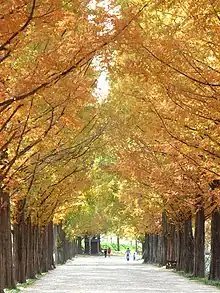
.jpg.webp)
Bamboo
Damyang is one of the northernmost places where bamboo can be found on the Korean peninsula, and its bamboo forests are well-known among Koreans. Many touristic attractions have been created to leverage that reputation: a Bamboo Theme Park / Daenamugol, a Bamboo Museum, a Bamboo Festival, a park filled with green bamboo (Juknokwon - 죽녹원).
Metasequoia
A stretch of metasequoia trees just outside Damyang-eup, planted during the Park Chung-Hee administration in the 1970s, has a long walking path of about two kilometers. The trees are particularly striking in late October to early November when their leaves turn bright colors. The walk gained nationwide popularity after a romantic drama was shot here. It was even picked as one of the most beautiful roads in all of Korea.[2]
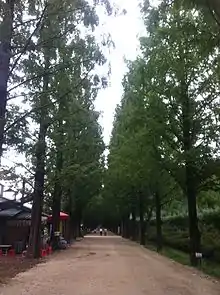
Culture
Food
- Jeollanam-do enjoys a good reputation for its cuisine, and Damyang provides a large choice of restaurants.
- The most popular specialities include Damyang ddeok galbi (tteokgalbi): this tasty and juicy marinated beef and pork mix, usually grilled at the table, is supposed to have originated either in Damyang or in Gwangju.
- Bamboo foods served at restaurants in Damyang include daetongbap (rice cooked in bamboo), tea places bamboo tea and the salad of raw bamboo with spicy vinegar.[3]
Literature
Several houses of famous scholars can be visited, and the Miam Diaries (Miam Yu Hui-chun: 1513–1577) are preserved in Daeduk-myon.
Events
- Damyang Bamboo Festival
- The V Asian-Pacific Astronomy Olympiad took place in Damyang in October 2009.
Dramas
Korean dramas have become a significant source of revenue for tourism, and many counties sponsor series or compete to host a few shootings, hoping to hit a jackpot similar to the localities 'blessed' with Winter Sonata's visit. Damyang boasts its metasequoia path (see above), and a 'movie village'.
Landmarks and Monuments
They include the fortress of Geumseongsanseong, and various national treasures (pagodas, pavilions... - overall, 66 properties, including 15 at the national level and 51 at the provincial level).
Infrastructure has followed the natural assets, and tourists can stay in themed resorts with local features such as hot baths perfumed with bamboo.
Temples
- Yongheungsa in Wolsa-myeon (not to be confused with Busan's Yonggungsa)
- Gaeseonsa in Nam-myeon.
Soswaewon
A private garden built by Yang San-bo (1503–1557), Soswaewon (소쇄원) stretches along a charming streamlet dotted with pavilions particularly suitable for meditation. A refreshing spot in the summer heat.
Juknokwon
Juknokwon was opened on May, 2003. This bamboo grove is 310,0002 wide. There are 8 trails which have different themes. And it was filming location of 'R-Point'.
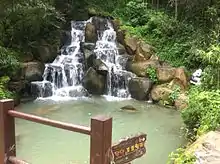
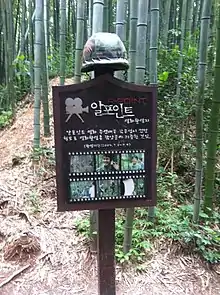
Gwanbangjerim
Gwanbangjerim is a forest created to protect Gwanbangje, an embankment along Damyangcheon Stream. It is designated as Natural Monument No. 366, and about 320 deciduous broadleaf trees of 15 species remain.
Sister cities
See also
References
- ↑ "Climatological Normals of Korea (1991 ~ 2020)" (PDF) (in Korean). Korea Meteorological Administration. Archived from the original (PDF) on 29 January 2022. Retrieved 7 June 2023.
- ↑ "담양 메타세쿼이아 가로수길에서 마라톤을.." Yeonhap news 2007.08.15
- ↑ "DAMYANG – A garden without bamboo is like a day without sunshine". Archived from the original on 11 December 2014. Retrieved 7 December 2014.
- ↑ "Washington's Sister Cities Relationships". Lieutenant Governor of Washington. Retrieved March 11, 2018.
- ↑ King, Rikki (December 29, 2015). "Lynnwood seeks input on proposed South Korean sister city". The Everett Herald. Retrieved March 11, 2018.
External links
 Damyang travel guide from Wikivoyage
Damyang travel guide from Wikivoyage- County government page Archived 2017-10-10 at the Wayback Machine
